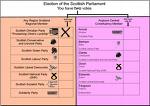
We must increase, not reduce voter choice.

We must increase, not reduce voter choice.
There seems to be a sort of consensus threatening to emerge over the idea that we may get, alongside PR-STV in the constituencies, some form of list system. This is to be welcomed, provided that it meets certain criteria:
1. That it be a National list. A regional list system, based on, say, euro constituncies, will defeat the purpose, in that we’ll just have deputies running around their super constituencies. Even with a national list, we’ll still have deputies trying to build a local base somewhere in the country. That’s the nature of the Irish political beast. The difference is that if it is a national list then voters can pick individual candidates based on something other than “he’s from my parish.”
2. That it be an Open list. It’s no use just letting parties publish their candidates and say “Just tick yay or nay to the whole package.” That defeats the purpose, which is to improve voter choice. By all means, allow voters to tick a box if they wish to vote for a particular party list, but they must also have a choice to vote for individual candidates. Voters should have more than one vote (I would say 5 votes of equal value) to allow them to take advantage of the wide choice of candidates available. What’ll be interesting is that unlike in the UK, where leftwingers anywhere could vote for say, Tony Benn, under such a system, many existing Irish deputies, who have little going for them other than the area they are from, will struggle under such a system. They won’t have a broad issue base to appeal wider, whereas more policy orientated candidates will have a wider appeal. Colm O’Gorman on child protection issues, or Michael O’Leary appealing to businessmen acrosss the country, for example. This is how (hopefully) we’ll bring new people into the system.
3. There must be at least 30 seats. This is to keep the quota low, and allow small parties and independent candidates get elected. it will also allow non-Dublin candidates get elected.
4. Quotas for men and women. Each party should by law be required to ensure 40% of their list be made up of each sex, and that they be listed alternately male/female. If FF and FG are saying that they cannot find 15 competant women in their respective parties, they’re telling us a lot about their parties.
This can work, and can transform to a certain degree, although, as Trinity’s Elaine Byrne has pointed out, the culture has to change too. My own feeling is that both the political culture and the electoral system effect each other, and that this is a worthy first step.
